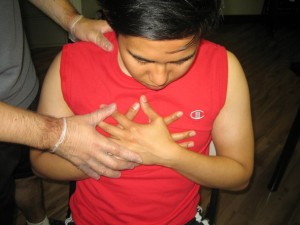Cardiogenic shock is a potentially life-threatening condition where your heart suddenly cannot pump enough blood to meet your body’s needs. This condition is mostly caused by a severe type of heart attack, but not everyone who suffers from a heart attack experiences a cardiogenic shock.
Cardiogenic shock is a rare condition, but it is often deadly if not treated promptly.
Signs and symptoms of cardiogenic shock
- Sudden, rapid heartbeat
- Weak pulse
- Low blood pressure
- Rapid breathing
- Severe shortness of breath
- Pale skin
- Loss of consciousness
- Sweating
- Cold hands or feet
- Less urine than normal or none
Since it usually arises among those who are experiencing a severe heart attack, it’s also vital to know the symptoms of a heart attack such as:

- A feeling of pressure, fullness, or squeezing pain in the chest that lasts for more than a few minutes
- Pain that extends to your shoulders, one or both arms, back, and even to your jaw and teeth
- Increasing episodes of chest pain
- Shortness of breath
- Sweating
- Sudden dizziness
- Nausea and vomiting
You should seek medical care immediately if you start developing any of these signs or symptoms to decrease your risk of developing a cardiogenic shock.
When to see a doctor
You should see a doctor immediately if you experience any of these symptoms as getting a heart attack treatment will quickly improve your chances of survival and minimizes damage to your heart. Call 911 immediately or any other emergency medical services for help if you or anyone experience symptoms similar to a heart attack.
Causes
In most cases of cardiogenic shock, it occurs because of a lack of oxygen to the heart, which is usually caused by a heart attack damages the heart’s main pumping chamber, the left ventricle. Without any oxygen-rich blood that is circulating in that area of the heart, the heart muscles can weaken and can go into cardiogenic shock.
In rare cases, any damage to the heart’s right ventricle, which is responsible for sending deoxygenated blood to your lungs to receive oxygen, can lead to a cardiogenic shock.
Other reasons that could cause a cardiogenic shock include:
- A condition named as myocarditis, where the heart muscles are inflamed
- A condition named endocarditis, where the heart valves have an infection
- A weakened heart from any cause
- Drug overdose or poisoning with substances that affect the heart’s ability to pump blood
Risk factors
- You are female
- An older age
- A previous history or experience of heart failure or heart attack
- A blockage in several main arteries of the heart
- Diabetes or high blood pressure
FACT CHECK
https://www.mayoclinic.org/diseases-conditions/cardiogenic-shock/symptoms-causes/syc-20366739

